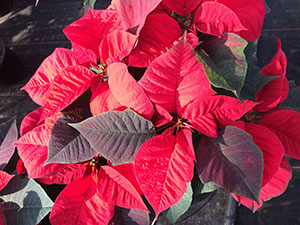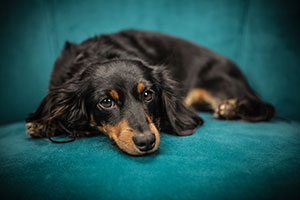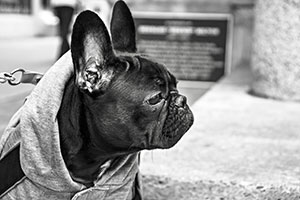Your Holiday Pet-Safety Checklist
Thanksgiving has come and gone. The temperatures are now consistently low enough to bother the non-native Chicagoans. Bears fans are looking forward to the next NFL draft. And holiday music is leaking out of every single possible speaker, phone, and computer screen.
That means it’s time for us to be the sobering voice of reason and remind you of the dangers to our pets posed by the holiday season.
As your mind drifts to holiday gift lists, vacations, and the slew of abnormal scheduling that occurs during December, pay attention to these concerns and keep your beloved cats and dogs safe and happy.
In no particular order:
Gift Wrapping
Cats love ribbons. Cats eat ribbons. Cats are not meant to eat ribbons. If you have a cat, just avoid ribbons and if you get a gift with ribbons, throw the ribbons away immediately. If you are giving gifts to someone with cats, avoid ribbons. At the risk of disrupting the ribbon industry, I would be happy if ribbons were banned from holiday traditions.
Christmas Trees
Dogs and cats eat tinsel. Tinsel ingestion can lead to, minimally, stomach upset (diarrhea, vomiting, pain, etc.) and, maximally, foreign body obstruction that requires medical intervention.
Dogs and cats also like to chew on Christmas trees and wreaths. We have had a few cats, recently, come in for allergic reactions to glue or fake snow sprayed on wreaths. There is no great way of preventing your animals from getting to these things unless wreaths are hung in places they can’t get to and the tree is put in rooms that can be closed when you are not there to monitor your pets.
More seriously, you have to be careful that your pets do not chew lights and ornaments. Electrocution is possible, causing serious to fatal effects. Ingestion of glass ornaments can cause severe mouth and gastrointestinal bleeding, etc. And then as if this slew of fears isn’t enough to make you anxious, always remember that animals can knock over trees causing damage to themselves and your house.
On a lesser note, I think that every cat and most dogs are very tempted to defecate and urinate in the Christmas tree. Plan on needing some extra scented candles to mask the holiday urine and feces smell-fest.
If you are the sort to wrap a food gift and place it under the tree, please understand that your animals do not respect the lovely ceremonial waiting until Christmas morning to find out what is there. We’ve seen people put candies in stockings, meat products in boxes, and cakes and treats in bags, all to find everything gone in the morning. The subsequent and joyous Christmas morning ER visit may then be needed.
Hanukkah Candles
This also applies to all candles: Make sure to keep all open flames away from animals that could jump on the table and knock the candle over or be burned. Hanukkah candles are not to be extinguished for any reason, so that may mean making sure you don’t buy candles that last for hours. (Hint: The cheaper they are, the faster they burn.)
Treats
Cookies, cakes, pot roast, candied hams/yams, candy. Your animals want all of this. If you bake a cake and then set it down to go check on the kids, your dog will eat it. Your cat will jump on the counter and lick frosting from a bowl. They are probably working together to distract you.
Also, giving your dog a lick of turkey or ham juice may seem like a wondrous holiday gift, but if everyone at dinner or in the house does the same thing, you will be finding that diarrhea, pain, vomiting, and a trip to the ER may also be needed to take care of gastroenteritis/pancreatitis, etc.
As always, be super careful about chocolate.
The bottom line is this: Dogs and cats are a part of our lives and we want them to participate in our holiday fun. But they do not need to eat special things. Put a bow on their normal food or arrange their wet food in the shape of a Christmas tree. They will be happy.
Plants
Poinsettias, mistletoe, and holly can all cause gastrointestinal upset, especially if a large amount is eaten. More seriously is ingestion of decorative lilies and daffodils by cats. Christmas/peace lilies can kill cats. Daffodils, less so, but can cause severe irritation. Just be watchful of pets ingesting anything not normally in the house.
Pet Anxiety
Leaving the house for the day, bringing your dogs/cats to the in-laws, having the new downstairs neighbor check up on the animals…all these things can cause anxiety and secondary stress. Remember that our animals do not always find it fun to travel, see new environments with new smells, animals, kids, etc., or be alone or with strangers taking care of them.
If you have a sensitive dog or cat, try having the caretaker come over a few times before you go to meet the pet and make the pet more comfortable. If you need go out of town, consider finding an alternative, such as leaving your pet with people they already know and trust. If you are going to be gone for longer than normal, make sure pets have ample food and water. If they already suffer from known problems (like GI sensitivity), consider being proactive and giving them gastroprotectants (with our approval) before they get sick. Also think how a giant tree with flashing lights and noises in their favorite corner of the living room may affect their mood and security.
General Cold Weather Wintering for Our Pets
First, remember that your little 20-pound short-haired dog needs to be dressed for winter when going out. Not all of us have Alaskan Malamutes and Huskies. A quick trip around the block in 0-degree weather can be dangerous and uncomfortable. Get some nice winter clothes at the pet supply store or online now before it becomes horrible outside.
Also be careful about the temperature of your home. Maybe this is your first year with a pet and you are used to turning down the heat to 62 when you leave for work. Your little short-haired kitty may be really uncomfortable with that temperature. All pets are different, so talk it over with us, or assess on your own that they are doing their normal things like playing, eating, drinking, etc.
The salt on the sidewalks can cause serious irritation and harm to animals. I like using Mushers Wax on the dog’s paws when they get irritated. It also helps protect paws from the cold, to a degree. You can get this online or at most pet supply stores.
The cold weather makes a dog’s normal outdoor activities (walking, playing in the yard, socializing with other dogs, etc.) less frequent. Take seasonal depression into account when thinking about how your pets feel without these normal stimuli. Come up with some new indoor rituals to replace his extra walk, like fetching, wrestling, or various games. Try having play dates with other (fully vaccinated) dogs with whom your dog gets along. This doesn’t really apply as much to cats, but you should be doing this with your cats any way.
With winter weather comes the use of anti-freeze in our cars. Just be very careful and remember how toxic this is to all animals and humans. If you spill anti-freeze in the garage, DO NOT let your dog go in the garage. Do not leave it around unopened for it to spill even more. Do not throw out any rags with anti-freeze without securing them in a container that would be hard to eat or lick. Be careful of the feral or stray cats that may also seek sanctuary in your garage and also can die from exposure.
Also, despite the projections for a cold Chicago winter, fleas and ticks are still around. We’ve been treating many dogs this season for these parasites. Ticks can live when it is above freezing. When you decide to go on a holiday hike in the forest preserve during a 40-degree Saturday, pets can have tick exposure. You cannot always see ticks, but they are there.
Lastly, New Year’s in a city is always loud. If the most recent Cubs outbreak of loud celebration can tell us anything, it’s that the animals of Chicago did not like the secondary outbreak of fireworks, pots and pans, screaming, and (in our case) Scottish bagpipes being played for hours outside our window. Dr. Kelly Ballantyne, our veterinary behaviorist here, previously discussed how to help noise-averse dogs. In general, remember that having anti-anxiety medications can be very helpful for this situation. Just being aware can help prevent the situation getting out of hand. Closing windows, using white noise distractors, and being attentive and helping your pets get through the countdown on New Year’s Eve can really help. The most common side effects of severe stress is gastroenteritis (vomiting, diarrhea, lack of appetite), self-trauma (licking, biting), and sometimes aggression toward other animals or owners.
Thanks for reading. I hope your holidays are wonderful and stress-free for you and your pets.
P.S. We like pet holiday cards in case you are the sort to send them out to people.
Brett Grossman, DVM
Medical District Veterinary Clinic









